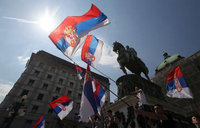
Serbia acts like Russia's best friend in Europe

The Republic of Serbia is a key state in the Balkans. This is well understood both in the West and in Russia. Why would the consolidated pro-Western leadership of Serbia take an unprecedented step and invite Vladimir Putin to Belgrade to celebrate victory over fascism, given the fact that even one mentioning of victory annoys the USA?
Until now, it seemed that the victory of the Serbian Progressive Party (SPP) in the early parliamentary elections in March marked the successful completion of the 14-year transitional period of Serbia's reorientation to the West. All of a sudden, prior to the arrival of Russian President Vladimir Putin in Belgrade to celebrate the 75th anniversary of the liberation of the capital from Nazi, Prime Minister and leader of the SPP, Alexander Vucic, said that Serbia was a free and independent state, which was going on the European path of development, but would not impose any sanctions against Russia.
Vucic told TASS that the liberation of Belgrade from Nazi invaders was made possible owing to the support of the Red Army. "This event is one of our most important historic victories, and we are proud that this year we can celebrate this anniversary - the final victory over fascism in Serbia - in a special way, - said Vucic. - We are grateful to our ancestors, who freed us from fascism. We must not admit a possibility for this threat to emerge again," he noted. He added that Serbia has never concealed its European choice from Russian partners and has never felt pressure from Russia at this point.
President Vladimir Putin, on a visit to Belgrade, attended the military parade, in which 4.5 thousand troops took part. The parade was held for the first time since 1985. Russian aerobatic team "Swifts" took part in the parade as well.
"The parade carries its own meaning as Serbia and Russia cooperate closely, - Irina Rudneva, Ph.D., researcher at the Centre for the Contemporary Balkan Crisis of the Institute of Slavic Studies, told Pravda.Ru. - This is a demonstration of unity, which is extremely annoying for the USA. Since the coming of Vladimir Putin to power, Russia has taken the course on the support of Serbian interests. This concerns the question of Kosovo in the first place. We can see that Serbia is interested in cooperation with Russia, for example, on the South Stream project. Serbia does not intend to infringe upon our interests," the expert said.
Serbian Prime Minister Vucic said that he wanted to attract Russian investors primarily in the sector of agricultural products, to participate in the privatization of 502 Serbian companies. He added that the energy sector was one of the most important areas of the Russian-Serbian cooperation.
However, there are people in Serbia, who do not like such a position. Repeating the mantra of Western media, they look for the trace of "dictator Putin," who, waving energy weapons, wants to conquer Serbia. Why not? There is no Russian presence on the Balkans, after she hastily left Kosovo. It would be good for Russia to designate its position in the region. It will pay off.
Some people in Serbia complain that the Russians had not sold S-300 to Serbia and dumped the Serbians in Bosnia. These are common complaints from those, who are used to shift their blame on others. They should try to recollect, for example, how Broz Tito was maneuvering between the West and the Soviet Union, uniting the country: Yugoslavia was not in the Warsaw Pact, but it was playing an important role at the Council for Mutual Economic Assistance.
Russia is highly important for Serbia as a strategic partner, and is can give Belgrade the help that the latter can not obtain from the EU, analyst and expert on international affairs, Franz-Stefan Gadi wrote on the pages of The National Interest. According to him, Serbia gradually loses interest in European integration, because they understand that accession to the EU may change nothing in the life of Serbia. The country can be a member of the European Union and serve as an observer at the CSTO, thus fulfilling an important role of mediator between Russia and the West.
"Against the backdrop of mutual sanctions between Russia and the EU, Serbia has obtained a chance to become a major supplier of goods (especially food) to the Russian market. Today, it is more profitable for Serbia to remain neutral, rather than seek EU membership. Neutral Serbia can become an intermediary between the EU and Russia. In this case, Serbia will not have to join the anti-Russian military alliance, NATO, " Irina Rudneva told Pravda.Ru.
Well, one is left to hope that the Serbian leadership, after routine statements of "friendship, brotherhood and cooperation" with the Russian side will prove their words with real action.
Lyuba Lulko
Pravda.Ru